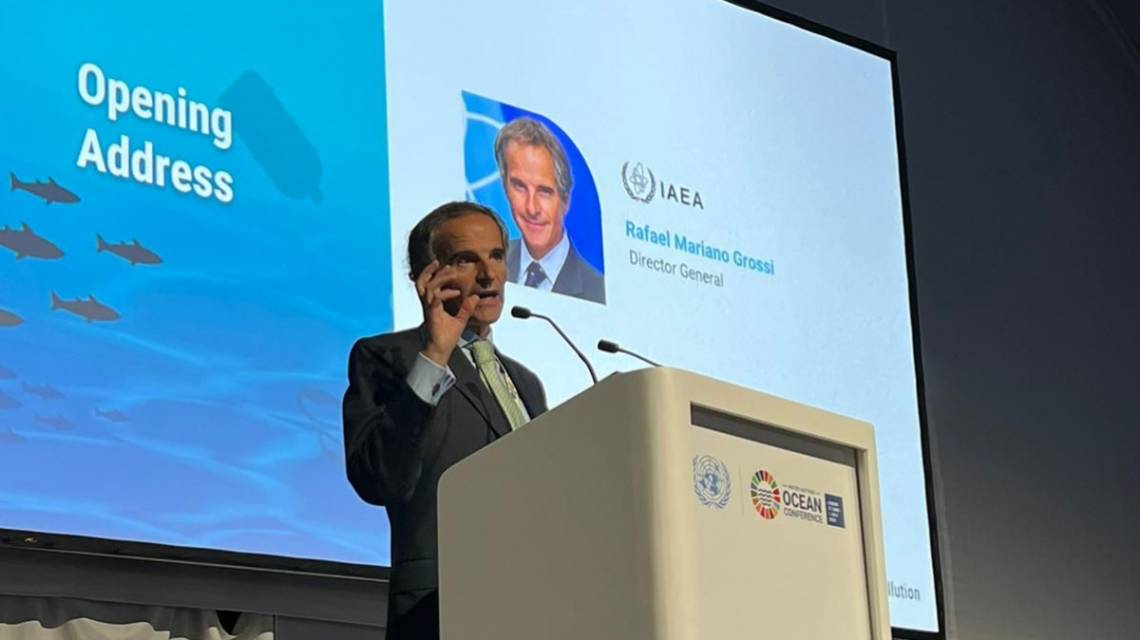According to the International Union for Conservation of Nature, at least 14 million tons of plastic end up in the ocean every year. That plastic makes up 80 per cent of all marine debris, which entangles animals and is ingested by marine species. Marine plastic pollution is a global threat, and according to projections, by 2025 the ocean will contain one tonne of plastic for every three tonnes of fish. By 2050, there may be more plastic in the ocean than fish. This environmental issue transcends national borders and therefore requires a truly global partnership that cuts across countries and organizations, IAEA Director General Rafael Mariano Grossi said today.
"Plastic pollution is one of the major environmental challenges of this century and greatly affects land, waterways, and oceans. No country can adequately address this challenge alone," Mr Grossi said at a side event organized at the 2022 UN Ocean Conference in Lisbon, Portugal. "Now is the time to commit to a more enhanced global approach against plastic pollution that includes joint action and decision-making based on the latest and most innovative science available."
Highlighting the IAEA's initiative, Nuclear Technology for Controlling Plastic Pollution (NUTEC Plastics), launched last year, Mr Grossi emphasized that nuclear applications could help both in the ocean and on land. NUTEC Plastics is dedicated to helping countries use various nuclear techniques to provide science-based evidence to characterize and assess marine microplastic pollution, while also demonstrating the use of ionizing radiation in plastic recycling by transforming plastic waste into reusable resources.
"Nuclear techniques can help us assess and understand the dimension of our marine plastic pollution problem, including identifying the nature and the amount of plastic waste floating in the ocean," Mr Gossi said. "Nuclear can also play a role in reducing the amount of plastic that lands in the ocean: recycling through radiation techniques will allow us to produce materials that can be used in other ways."
Now is the time to commit to a more enhanced global approach against plastic pollution that includes joint action and decision-making based on the latest and most innovative science available.

IAEA Director General Rafael Mariano Grossi delivered the opening address to 'Addressing Marine Plastic Pollution: How international cooperation and partnerships across science and technology can build capacities and lead to systems innovation', a side event at the 2022 UN Ocean Conference. (Photo: D. Candano/IAEA)
Partnering against marine plastic pollution
The United Nations Sustainable Development Goal (SDG) target 14.1 calls for preventing and significantly reducing marine pollution of all kinds, in particular from land-based activities, including marine debris and nutrient pollution by 2025.
The side event, titled 'Addressing Marine Plastic Pollution: How international cooperation and partnerships across science and technology can build capacities and lead to systems innovation', was organized by the IAEA in cooperation with the Circulate Initiative and the Incubation Network. It brought together country representatives, international and non-governmental organizations, funding agencies and renowned scientists to discuss ways to build a global partnership and develop science-based and innovative solutions to tackle the marine plastic pollution.
"Global and regional partnerships are key to addressing marine plastic pollution," said Kwaku Afriyie, Ghana's Minister of Environment, Science, Technology and Innovation. "As inhabitants of Earth, we need to explore new technologies for tackling this issue, particularly nuclear technologies."
The Minister said that Ghana was one of the first countries to partner with the IAEA at the launch of NUTEC Plastics and has greatly benefited from IAEA technical cooperation support in many areas of peaceful nuclear applications.
Financing was also highlighted as a key pillar of sustainable action against plastic waste. "Governments should actively explore innovative financing solutions, prop up investment in waste management, research and development on product design, and technical capacity building," said Kristin Hughes, Director of the Global Plastic Action Partnership and Member of the Executive Committee at the World Economic Forum.
Other speakers at the side event were Alvaro Morales Ramirez, Director of the Research Center in Sciences of the Sea and Limnology (CIMAR) at the University of Costa Rica; Simon Baldwin, Global Head of Circularity at SecondMuse; and Ellen Martin, Chief Impact Officer of Circulate Capital and Director of impact and Insights at the Circulate Initiative.

Kwaku Afriyie, Ghana's Minister of Environment, science, technology and innovation calls for the exploration of new technologies, including nuclear applications, to tackling marine plastic pollution. (Photo: D. Candano/IAEA)






